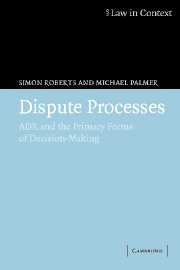Book contents
- Frontmatter
- Contents
- Preface
- Acknowledgements
- 1 Introduction
- 2 Cultures of Decision-making: Precursors to the Emergence of ADR
- 3 The Debates Around Civil Justice and the Movement Towards Procedural Innovation
- 4 Disputes and Dispute Processes
- 5 Negotiations
- 6 Mediation
- 7 Umpiring
- 8 Hybrid Forms and Processual Experimentation
- 9 The Trajectory of Alternative Dispute Resolution
- Bibliography
- Index
Preface
Published online by Cambridge University Press: 05 June 2012
- Frontmatter
- Contents
- Preface
- Acknowledgements
- 1 Introduction
- 2 Cultures of Decision-making: Precursors to the Emergence of ADR
- 3 The Debates Around Civil Justice and the Movement Towards Procedural Innovation
- 4 Disputes and Dispute Processes
- 5 Negotiations
- 6 Mediation
- 7 Umpiring
- 8 Hybrid Forms and Processual Experimentation
- 9 The Trajectory of Alternative Dispute Resolution
- Bibliography
- Index
Summary
This book has grown out of more than a decade of teaching Alternative Dispute Resolution (ADR) for postgraduate students in law at the University of London, as well as many years of research and writing in this field by both of us. The approach taken in assembling the text and materials is intentionally wide-ranging and comparative; – indeed, more so than in the first edition – so that it can be read not only in its own right but also as a broader, contextualising companion to more conventional and jurisdiction-specific ADR texts. The present study is also informed by the view that adversarial litigation can no longer be seen as the paradigmatic process of decision-making in our civil justice system. Looking first at the sources of ADR ideas and the debates which have surrounded the rise of alternative approaches to dispute resolution, we then move on to examine the primary forms of decision-making: negotiation, mediation and umpiring. This is followed by an exploration of the emergence in contemporary Anglo-American practice of the fusions of the foundational modes of decision-making that are generally referred to as hybrid or mixed processes.
In putting together this book, we have been given generous help by others. First, we would like to acknowledge the inspiration we have derived from Hilary Astor and Christine Chinkin's pioneering book Dispute Resolution in Australia (1992; 2nd edn, 2002).
- Type
- Chapter
- Information
- Dispute ProcessesADR and the Primary Forms of Decision-Making, pp. xiiiPublisher: Cambridge University PressPrint publication year: 2005

